LML6003 - Australia's Visa System: Application and Case Analysis
VerifiedAdded on 2023/06/12
|8
|1399
|189
Report
AI Summary
This report provides legal advice concerning Australian migration law, specifically focusing on visa applications and related issues. It addresses two scenarios: one involving Mrs. Anh, who entered Australia on a Prospective Marriage visa (subclass 300) and faces family violence, and another involving Mrs. Petra, a bridging visa holder whose husband was paralyzed in an accident. The advice for Mrs. Anh details her options for applying for a permanent visa, including the possibility of claiming family violence under Migration Regulation 1994, while also emphasizing the need to apply for a temporary partner visa (subclass 820) first. For Mrs. Petra, the report analyzes the implications of the Waensila v Minister for Immigration and Border Protection case, arguing that her circumstances meet the criteria for compelling grounds, allowing for a waiver of certain requirements under Schedule 3 of the Migration Regulation. The report references relevant legislation and case law to support its analysis and advice, providing a comprehensive overview of the legal considerations involved in these migration scenarios.
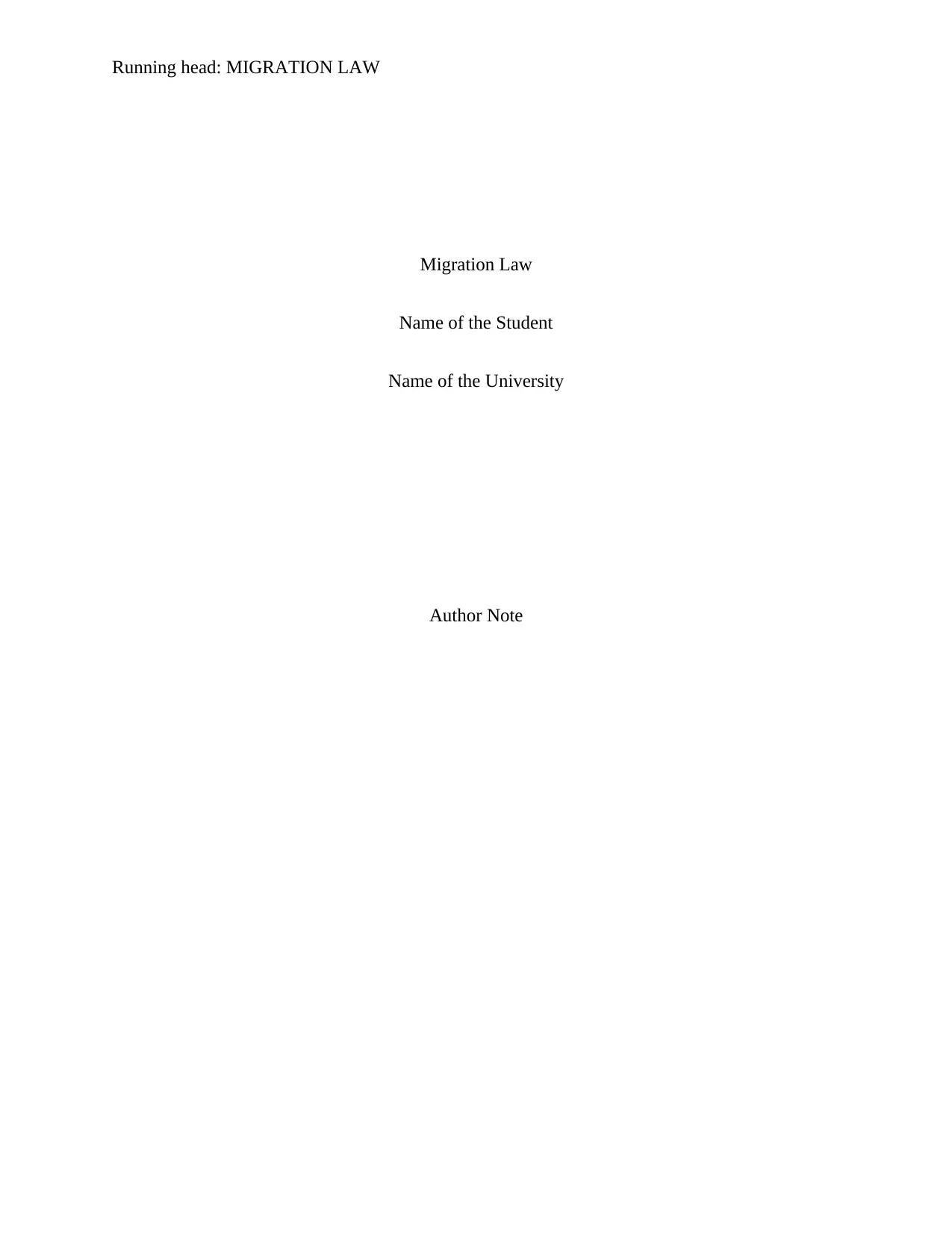
Running head: MIGRATION LAW
Migration Law
Name of the Student
Name of the University
Author Note
Migration Law
Name of the Student
Name of the University
Author Note
Paraphrase This Document
Need a fresh take? Get an instant paraphrase of this document with our AI Paraphraser
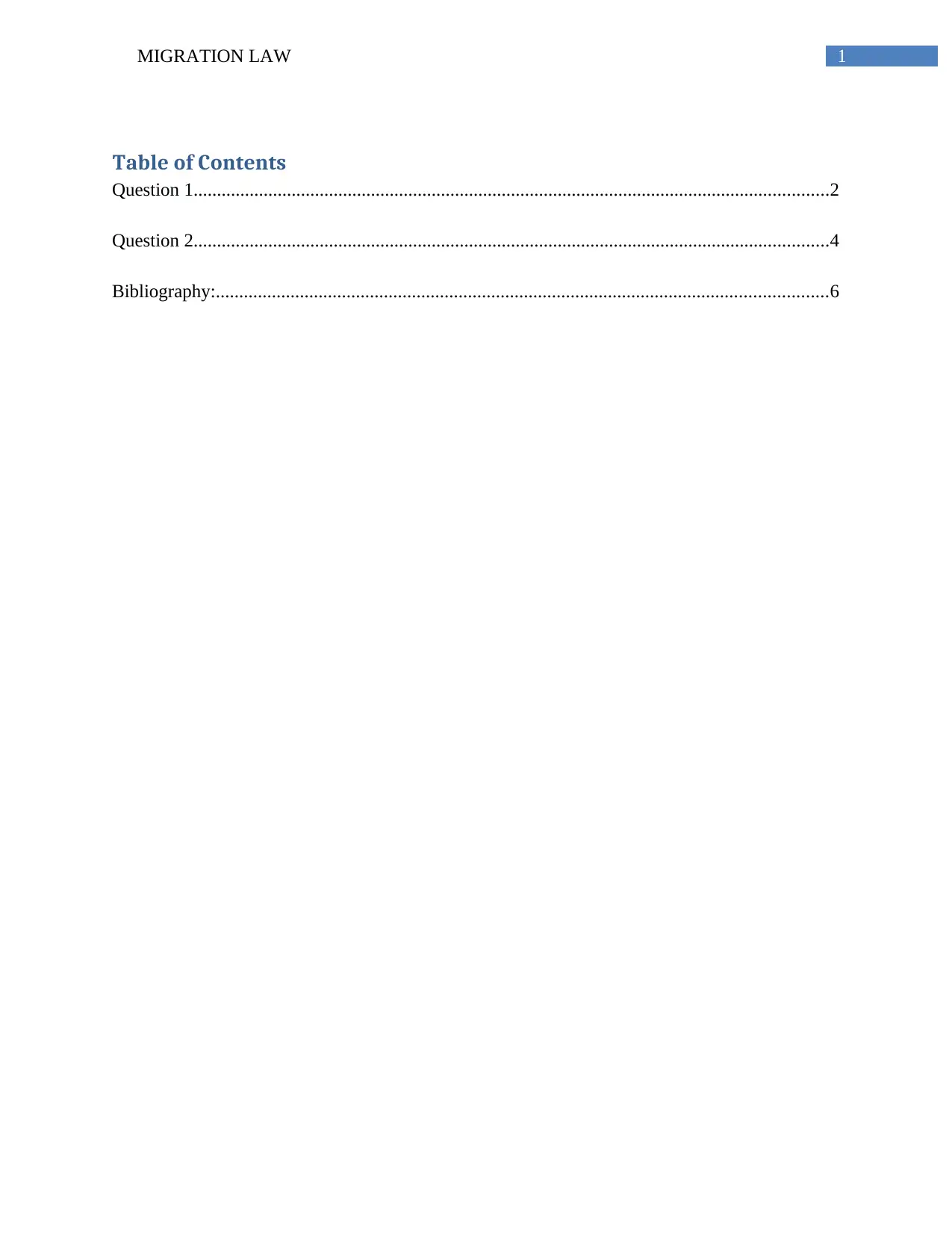
1MIGRATION LAW
Table of Contents
Question 1........................................................................................................................................2
Question 2........................................................................................................................................4
Bibliography:...................................................................................................................................6
Table of Contents
Question 1........................................................................................................................................2
Question 2........................................................................................................................................4
Bibliography:...................................................................................................................................6
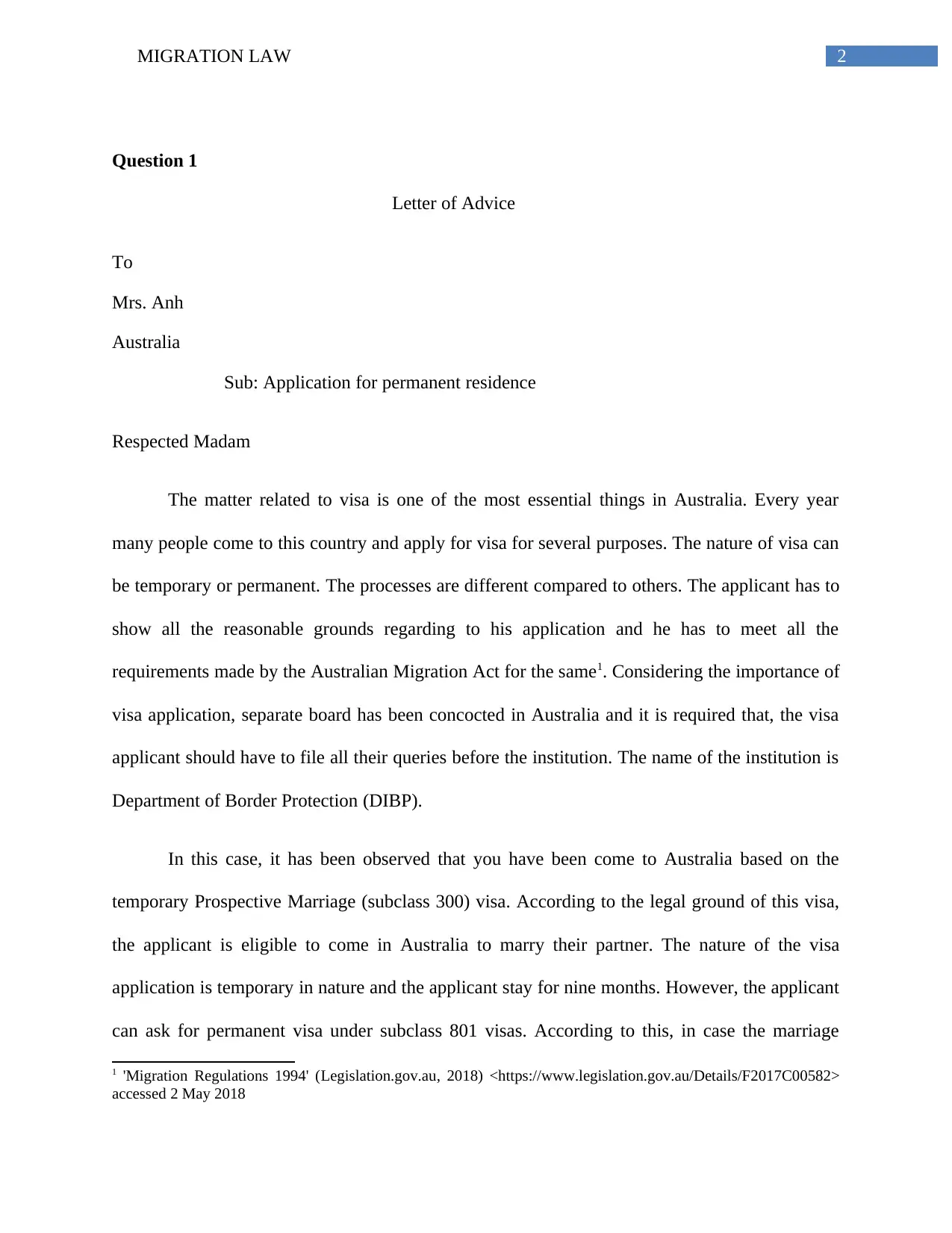
2MIGRATION LAW
Question 1
Letter of Advice
To
Mrs. Anh
Australia
Sub: Application for permanent residence
Respected Madam
The matter related to visa is one of the most essential things in Australia. Every year
many people come to this country and apply for visa for several purposes. The nature of visa can
be temporary or permanent. The processes are different compared to others. The applicant has to
show all the reasonable grounds regarding to his application and he has to meet all the
requirements made by the Australian Migration Act for the same1. Considering the importance of
visa application, separate board has been concocted in Australia and it is required that, the visa
applicant should have to file all their queries before the institution. The name of the institution is
Department of Border Protection (DIBP).
In this case, it has been observed that you have been come to Australia based on the
temporary Prospective Marriage (subclass 300) visa. According to the legal ground of this visa,
the applicant is eligible to come in Australia to marry their partner. The nature of the visa
application is temporary in nature and the applicant stay for nine months. However, the applicant
can ask for permanent visa under subclass 801 visas. According to this, in case the marriage
1 'Migration Regulations 1994' (Legislation.gov.au, 2018) <https://www.legislation.gov.au/Details/F2017C00582>
accessed 2 May 2018
Question 1
Letter of Advice
To
Mrs. Anh
Australia
Sub: Application for permanent residence
Respected Madam
The matter related to visa is one of the most essential things in Australia. Every year
many people come to this country and apply for visa for several purposes. The nature of visa can
be temporary or permanent. The processes are different compared to others. The applicant has to
show all the reasonable grounds regarding to his application and he has to meet all the
requirements made by the Australian Migration Act for the same1. Considering the importance of
visa application, separate board has been concocted in Australia and it is required that, the visa
applicant should have to file all their queries before the institution. The name of the institution is
Department of Border Protection (DIBP).
In this case, it has been observed that you have been come to Australia based on the
temporary Prospective Marriage (subclass 300) visa. According to the legal ground of this visa,
the applicant is eligible to come in Australia to marry their partner. The nature of the visa
application is temporary in nature and the applicant stay for nine months. However, the applicant
can ask for permanent visa under subclass 801 visas. According to this, in case the marriage
1 'Migration Regulations 1994' (Legislation.gov.au, 2018) <https://www.legislation.gov.au/Details/F2017C00582>
accessed 2 May 2018
⊘ This is a preview!⊘
Do you want full access?
Subscribe today to unlock all pages.

Trusted by 1+ million students worldwide
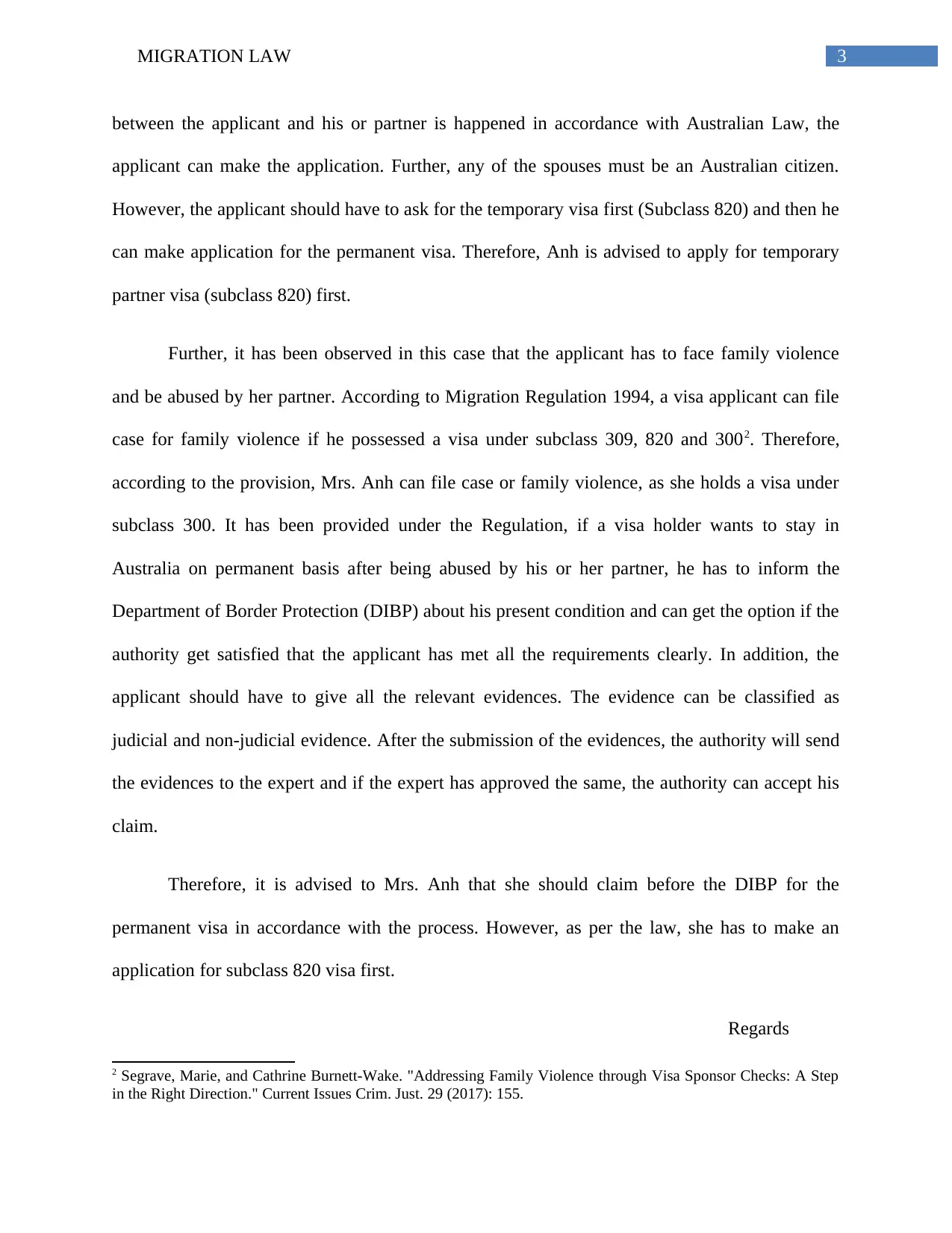
3MIGRATION LAW
between the applicant and his or partner is happened in accordance with Australian Law, the
applicant can make the application. Further, any of the spouses must be an Australian citizen.
However, the applicant should have to ask for the temporary visa first (Subclass 820) and then he
can make application for the permanent visa. Therefore, Anh is advised to apply for temporary
partner visa (subclass 820) first.
Further, it has been observed in this case that the applicant has to face family violence
and be abused by her partner. According to Migration Regulation 1994, a visa applicant can file
case for family violence if he possessed a visa under subclass 309, 820 and 3002. Therefore,
according to the provision, Mrs. Anh can file case or family violence, as she holds a visa under
subclass 300. It has been provided under the Regulation, if a visa holder wants to stay in
Australia on permanent basis after being abused by his or her partner, he has to inform the
Department of Border Protection (DIBP) about his present condition and can get the option if the
authority get satisfied that the applicant has met all the requirements clearly. In addition, the
applicant should have to give all the relevant evidences. The evidence can be classified as
judicial and non-judicial evidence. After the submission of the evidences, the authority will send
the evidences to the expert and if the expert has approved the same, the authority can accept his
claim.
Therefore, it is advised to Mrs. Anh that she should claim before the DIBP for the
permanent visa in accordance with the process. However, as per the law, she has to make an
application for subclass 820 visa first.
Regards
2 Segrave, Marie, and Cathrine Burnett-Wake. "Addressing Family Violence through Visa Sponsor Checks: A Step
in the Right Direction." Current Issues Crim. Just. 29 (2017): 155.
between the applicant and his or partner is happened in accordance with Australian Law, the
applicant can make the application. Further, any of the spouses must be an Australian citizen.
However, the applicant should have to ask for the temporary visa first (Subclass 820) and then he
can make application for the permanent visa. Therefore, Anh is advised to apply for temporary
partner visa (subclass 820) first.
Further, it has been observed in this case that the applicant has to face family violence
and be abused by her partner. According to Migration Regulation 1994, a visa applicant can file
case for family violence if he possessed a visa under subclass 309, 820 and 3002. Therefore,
according to the provision, Mrs. Anh can file case or family violence, as she holds a visa under
subclass 300. It has been provided under the Regulation, if a visa holder wants to stay in
Australia on permanent basis after being abused by his or her partner, he has to inform the
Department of Border Protection (DIBP) about his present condition and can get the option if the
authority get satisfied that the applicant has met all the requirements clearly. In addition, the
applicant should have to give all the relevant evidences. The evidence can be classified as
judicial and non-judicial evidence. After the submission of the evidences, the authority will send
the evidences to the expert and if the expert has approved the same, the authority can accept his
claim.
Therefore, it is advised to Mrs. Anh that she should claim before the DIBP for the
permanent visa in accordance with the process. However, as per the law, she has to make an
application for subclass 820 visa first.
Regards
2 Segrave, Marie, and Cathrine Burnett-Wake. "Addressing Family Violence through Visa Sponsor Checks: A Step
in the Right Direction." Current Issues Crim. Just. 29 (2017): 155.
Paraphrase This Document
Need a fresh take? Get an instant paraphrase of this document with our AI Paraphraser
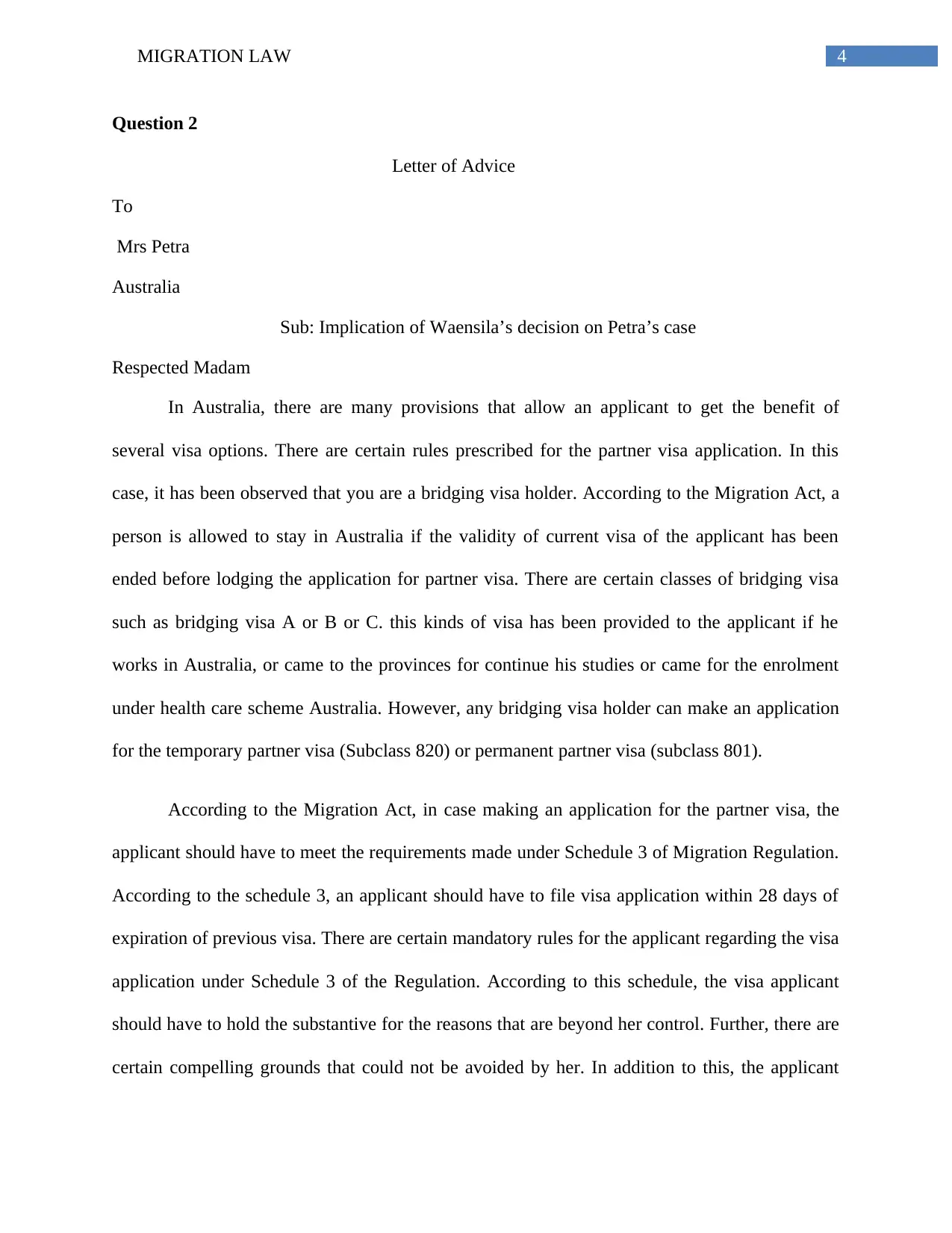
4MIGRATION LAW
Question 2
Letter of Advice
To
Mrs Petra
Australia
Sub: Implication of Waensila’s decision on Petra’s case
Respected Madam
In Australia, there are many provisions that allow an applicant to get the benefit of
several visa options. There are certain rules prescribed for the partner visa application. In this
case, it has been observed that you are a bridging visa holder. According to the Migration Act, a
person is allowed to stay in Australia if the validity of current visa of the applicant has been
ended before lodging the application for partner visa. There are certain classes of bridging visa
such as bridging visa A or B or C. this kinds of visa has been provided to the applicant if he
works in Australia, or came to the provinces for continue his studies or came for the enrolment
under health care scheme Australia. However, any bridging visa holder can make an application
for the temporary partner visa (Subclass 820) or permanent partner visa (subclass 801).
According to the Migration Act, in case making an application for the partner visa, the
applicant should have to meet the requirements made under Schedule 3 of Migration Regulation.
According to the schedule 3, an applicant should have to file visa application within 28 days of
expiration of previous visa. There are certain mandatory rules for the applicant regarding the visa
application under Schedule 3 of the Regulation. According to this schedule, the visa applicant
should have to hold the substantive for the reasons that are beyond her control. Further, there are
certain compelling grounds that could not be avoided by her. In addition to this, the applicant
Question 2
Letter of Advice
To
Mrs Petra
Australia
Sub: Implication of Waensila’s decision on Petra’s case
Respected Madam
In Australia, there are many provisions that allow an applicant to get the benefit of
several visa options. There are certain rules prescribed for the partner visa application. In this
case, it has been observed that you are a bridging visa holder. According to the Migration Act, a
person is allowed to stay in Australia if the validity of current visa of the applicant has been
ended before lodging the application for partner visa. There are certain classes of bridging visa
such as bridging visa A or B or C. this kinds of visa has been provided to the applicant if he
works in Australia, or came to the provinces for continue his studies or came for the enrolment
under health care scheme Australia. However, any bridging visa holder can make an application
for the temporary partner visa (Subclass 820) or permanent partner visa (subclass 801).
According to the Migration Act, in case making an application for the partner visa, the
applicant should have to meet the requirements made under Schedule 3 of Migration Regulation.
According to the schedule 3, an applicant should have to file visa application within 28 days of
expiration of previous visa. There are certain mandatory rules for the applicant regarding the visa
application under Schedule 3 of the Regulation. According to this schedule, the visa applicant
should have to hold the substantive for the reasons that are beyond her control. Further, there are
certain compelling grounds that could not be avoided by her. In addition to this, the applicant
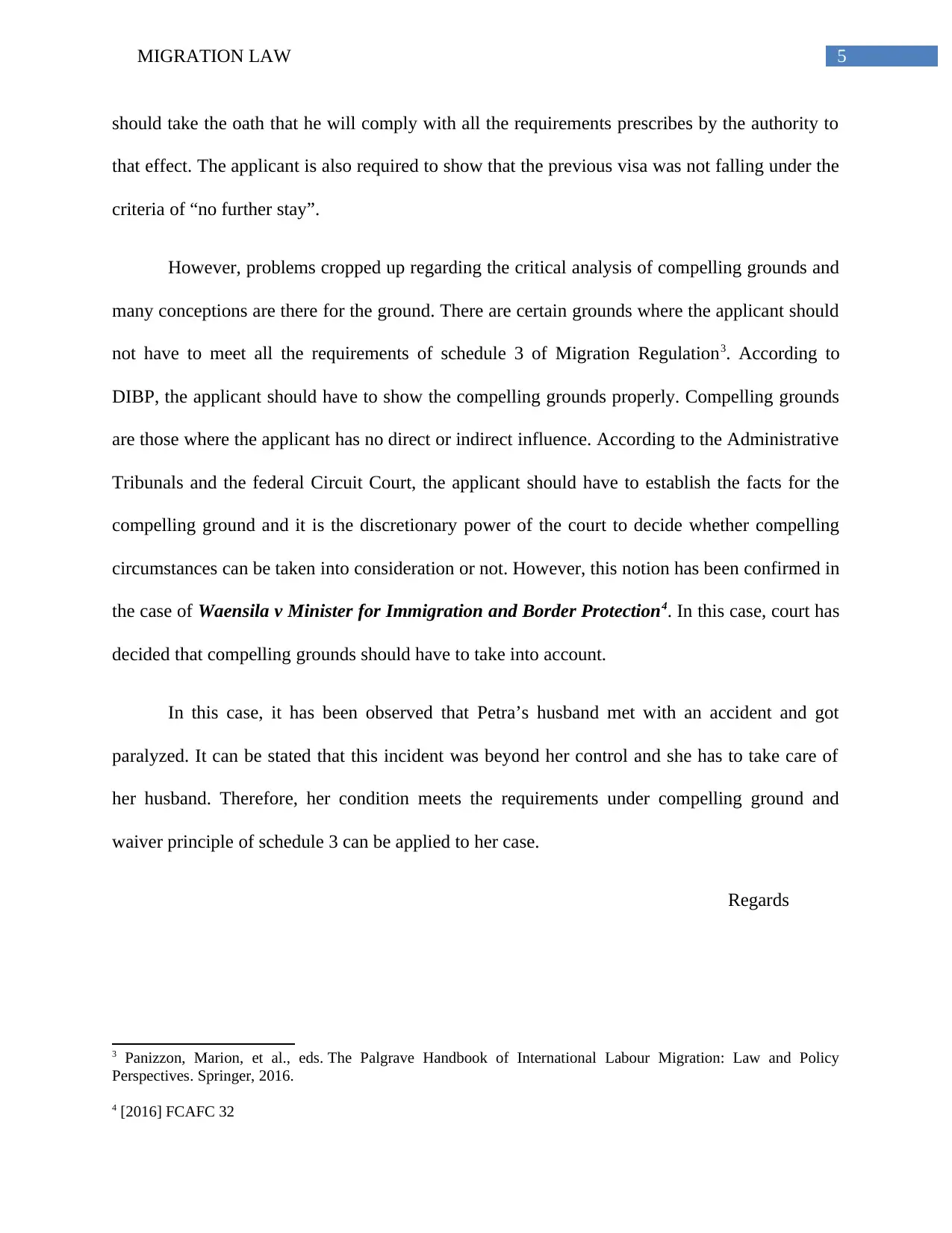
5MIGRATION LAW
should take the oath that he will comply with all the requirements prescribes by the authority to
that effect. The applicant is also required to show that the previous visa was not falling under the
criteria of “no further stay”.
However, problems cropped up regarding the critical analysis of compelling grounds and
many conceptions are there for the ground. There are certain grounds where the applicant should
not have to meet all the requirements of schedule 3 of Migration Regulation3. According to
DIBP, the applicant should have to show the compelling grounds properly. Compelling grounds
are those where the applicant has no direct or indirect influence. According to the Administrative
Tribunals and the federal Circuit Court, the applicant should have to establish the facts for the
compelling ground and it is the discretionary power of the court to decide whether compelling
circumstances can be taken into consideration or not. However, this notion has been confirmed in
the case of Waensila v Minister for Immigration and Border Protection4. In this case, court has
decided that compelling grounds should have to take into account.
In this case, it has been observed that Petra’s husband met with an accident and got
paralyzed. It can be stated that this incident was beyond her control and she has to take care of
her husband. Therefore, her condition meets the requirements under compelling ground and
waiver principle of schedule 3 can be applied to her case.
Regards
3 Panizzon, Marion, et al., eds. The Palgrave Handbook of International Labour Migration: Law and Policy
Perspectives. Springer, 2016.
4 [2016] FCAFC 32
should take the oath that he will comply with all the requirements prescribes by the authority to
that effect. The applicant is also required to show that the previous visa was not falling under the
criteria of “no further stay”.
However, problems cropped up regarding the critical analysis of compelling grounds and
many conceptions are there for the ground. There are certain grounds where the applicant should
not have to meet all the requirements of schedule 3 of Migration Regulation3. According to
DIBP, the applicant should have to show the compelling grounds properly. Compelling grounds
are those where the applicant has no direct or indirect influence. According to the Administrative
Tribunals and the federal Circuit Court, the applicant should have to establish the facts for the
compelling ground and it is the discretionary power of the court to decide whether compelling
circumstances can be taken into consideration or not. However, this notion has been confirmed in
the case of Waensila v Minister for Immigration and Border Protection4. In this case, court has
decided that compelling grounds should have to take into account.
In this case, it has been observed that Petra’s husband met with an accident and got
paralyzed. It can be stated that this incident was beyond her control and she has to take care of
her husband. Therefore, her condition meets the requirements under compelling ground and
waiver principle of schedule 3 can be applied to her case.
Regards
3 Panizzon, Marion, et al., eds. The Palgrave Handbook of International Labour Migration: Law and Policy
Perspectives. Springer, 2016.
4 [2016] FCAFC 32
⊘ This is a preview!⊘
Do you want full access?
Subscribe today to unlock all pages.

Trusted by 1+ million students worldwide
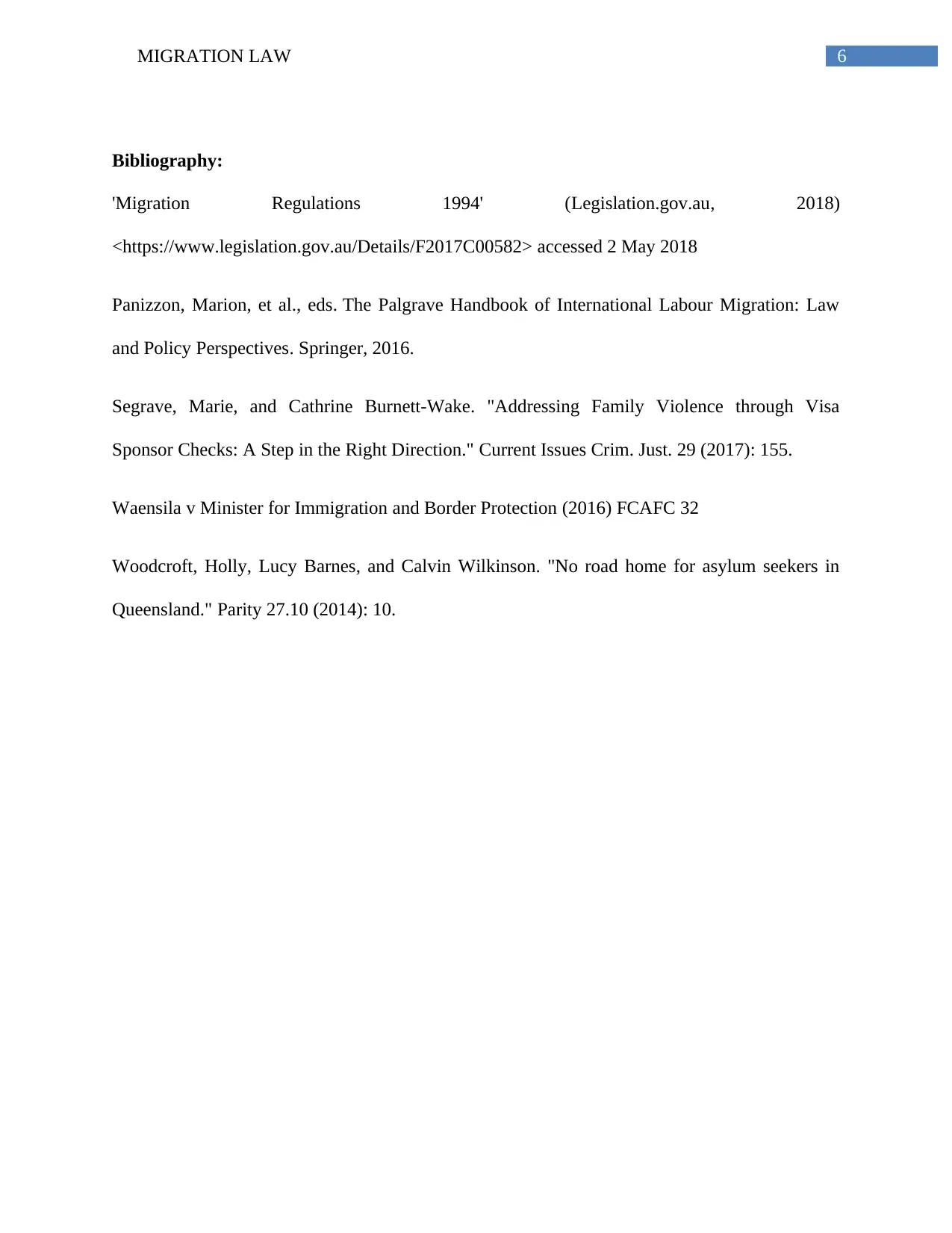
6MIGRATION LAW
Bibliography:
'Migration Regulations 1994' (Legislation.gov.au, 2018)
<https://www.legislation.gov.au/Details/F2017C00582> accessed 2 May 2018
Panizzon, Marion, et al., eds. The Palgrave Handbook of International Labour Migration: Law
and Policy Perspectives. Springer, 2016.
Segrave, Marie, and Cathrine Burnett-Wake. "Addressing Family Violence through Visa
Sponsor Checks: A Step in the Right Direction." Current Issues Crim. Just. 29 (2017): 155.
Waensila v Minister for Immigration and Border Protection (2016) FCAFC 32
Woodcroft, Holly, Lucy Barnes, and Calvin Wilkinson. "No road home for asylum seekers in
Queensland." Parity 27.10 (2014): 10.
Bibliography:
'Migration Regulations 1994' (Legislation.gov.au, 2018)
<https://www.legislation.gov.au/Details/F2017C00582> accessed 2 May 2018
Panizzon, Marion, et al., eds. The Palgrave Handbook of International Labour Migration: Law
and Policy Perspectives. Springer, 2016.
Segrave, Marie, and Cathrine Burnett-Wake. "Addressing Family Violence through Visa
Sponsor Checks: A Step in the Right Direction." Current Issues Crim. Just. 29 (2017): 155.
Waensila v Minister for Immigration and Border Protection (2016) FCAFC 32
Woodcroft, Holly, Lucy Barnes, and Calvin Wilkinson. "No road home for asylum seekers in
Queensland." Parity 27.10 (2014): 10.
Paraphrase This Document
Need a fresh take? Get an instant paraphrase of this document with our AI Paraphraser

7MIGRATION LAW
1 out of 8
Related Documents
Your All-in-One AI-Powered Toolkit for Academic Success.
+13062052269
info@desklib.com
Available 24*7 on WhatsApp / Email
![[object Object]](/_next/static/media/star-bottom.7253800d.svg)
Unlock your academic potential
Copyright © 2020–2025 A2Z Services. All Rights Reserved. Developed and managed by ZUCOL.




